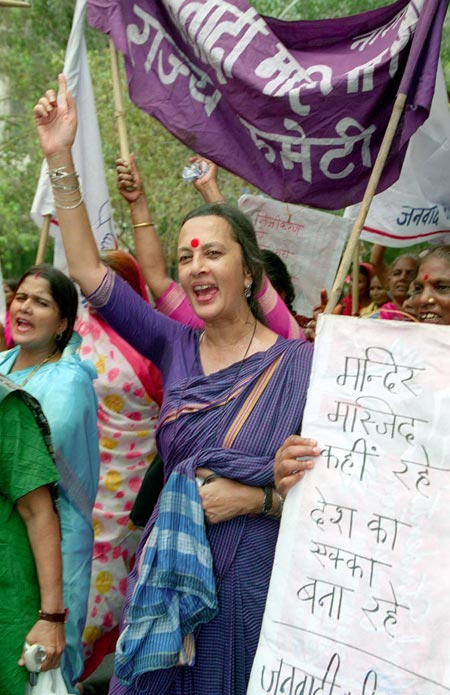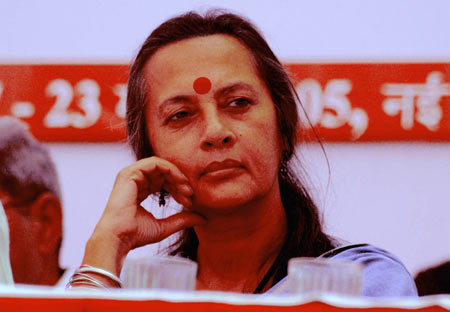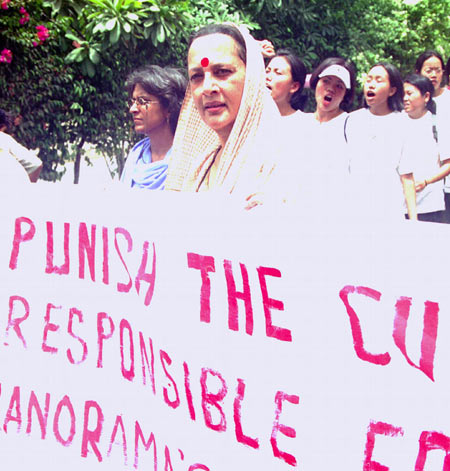 | « Back to article | Print this article |
Brinda Karat: Students must join people-based politics
She shares her views on higher education and what it takes to build a career in politics.
An alumnus of Miranda House and author of Survival & Emancipation: Notes from Indian Women's Struggles, Brinda Karat chose a career in politics to make an impact in society. Influenced by anti-war movements during the Vietnam War and Marxist ideology, she went on to become the first woman member of the CPI (M) politburo. From 1993 to 2004, she served as the General Secretary of the All India Democratic Women's Association, and thereafter its Vice President.
You were drawn to politics early in life...
After my diploma at Miranda House, followed by a history degree at University of Dehradun, I left for London to work with Air India in 1967. While working, I was influenced by the anti-war movements during the Vietnam War -- it triggered ferment among the student community against the war. My association with anti-imperialist movements led to an immediate change in me. I was inclined towards the Marxist ideology. I was 22, left my work and flew off to India to join the political party.
Do you feel students should be politically engaged?
Absolutely. The best way for political party membership is to get in touch with the organisation which is working where you are studying. People think getting into politics means getting in to fight an election. It's much more than an election -- you have to work for different sections of society and make a difference in policies and have a broader vision for the country.
Sadly, people are co-opted for electoral politics in which you have thousands of people campaigning to buy one party ticket -- it seems to be the general norm now. I won't advise students to march towards that route. I really wish students would stay away from ticket-based politics as it kills all idealism, hope and ambition. They must join struggle-based, people-based politics and not ticket-based politics. There is scope for a much bigger promotion.
Does Indian politics have enough women?
We need more girls to participate. You don't have to work full-time because you also have to earn your bread. If young people don't come in then you never get a fresh perspective filled with new ideas which are absolutely essential for the growth of any party. Before you plunge into politics, you have to be politically and ideologically sharp.
'I am totally against privatisation of education'
Joining politics and managing studies can be tough. Any advice?
You can't have political struggle without fulfilling your basic aim to study. If you have done good homework, and if you think you can afford to skip a class, then you can go for it. Definitely, there should be limited absence. The more regular you are in class, less you will cram at the end of the year.
I don't think you should move so far away from academics in the name of student activism. You should be able to balance the two. Unless you are good in academics, why should students respect you? If you are not going to be amongst students, then how are you going to mobilise them? I think there should be a combination between studying and struggle.
Do you support privatisation of education?
I am totally against it. You can't advocate right to education and then privatise education -- the two things can't go together. When you ask schools to reserve 25 per cent seats for Economically Weaker Section (EWS) children, still you are maintaining inequality. You need to have good quality education, which is publicly-funded, which produces good kids with good qualification.
There are few classic cases in states like Kerala where best kids are being produced from government schools.
At St. Stephen's, 65 per cent of students are women. To reverse this trend, the college's Supreme Council proposed reserving 40 per cent seats for boys.
It sounds absurd. St. Stephen's is supposed to be taking academically better students apart from the reservations, because they are a minority institution. I don't think there is any such policy, which is legal in which you do the change. The selection is entirely based on marks. The Stephen's Council is way out of line.
What's your view on quality and quantity in India's higher education? Unfortunately there are not many teachers.
It's a shame. I think we have good teachers. Colleges are not giving enough opportunity to those teachers who are willing to teach. Most of the teachers are victims of contractual services in colleges. The government should create a wider network for colleges, teachers and students. I believe knowledge is critical for India's growth. These foreign universities encouraging twinning programmes in India -- it's painful to hear that they are going to charge the same fee which they charge in their country. How are these courses going to help deprived kids who are academically bright and cannot afford exorbitant fee?
'Colleges must take corrective measures to prevent ugly ragging'
Students chase flexible bank loans to apply for expensive courses...
Bank loans which back up education are very questionable. Some institutes do not guarantee a job. With loans, a child gets into a life with a huge debt on his head. So that's unfair.
I believe strongly in right to higher education and the government should allocate adequate financial aid in the form of concessions to the needy kids. It's tragic to observe brain wastage in India -- where huge academically excelling talent is deprived of opportunities. The recent board exam showed how girls have outshone boys. All these developments show how much potential is there in India and government must speed up with equality measures.
Many parents lean towards single gender institutes. What's better -- co-ed or single gender?
I studied at a girl's school and college. I don't know whether it was an advantage. But I think co-ed schools are perfectly fine. I don't think there are any statistics to show that in co-ed school academic learning is lower than in the single gender school. What is the logic of it? There is a conservative understanding that girls should be segregated -- I certainly don't hold to it.
Ragging takes place in every college. Do you think it should be welcomed?
There are cases of brutal ragging where children have lost their lives. Colleges must take corrective measures to prevent ugly ragging. Instead of going deeper into ragging, why can't students organise get-togethers? It could be a platform to interact with freshers and seniors and play friendly games/competitions. Why do you want to back hierarchical situations where the young lot is forced into subordinate positions in the name of being introduced to institutions? You can have good introductory sessions, that too informal through various other means.


